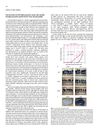 28 citations,
July 2002 in “Australasian Journal of Dermatology”
28 citations,
July 2002 in “Australasian Journal of Dermatology” Lupus can look like hair loss from alopecia areata but needs different treatment.
 27 citations,
November 2005 in “Archives of Dermatological Research”
27 citations,
November 2005 in “Archives of Dermatological Research” Choosing hair follicles at the same growth stage leads to more consistent hair growth experiments.
 27 citations,
January 1984 in “Pharmacology & Therapeutics”
27 citations,
January 1984 in “Pharmacology & Therapeutics” Antiandrogens have important biological effects, but more research is needed to understand them fully and compare their effectiveness and side effects to other treatments.
 27 citations,
October 1945 in “Endocrinology”
27 citations,
October 1945 in “Endocrinology” Synthetic hormone treatment reduces melanin and hair growth in rats.
 26 citations,
February 2020 in “Frontiers in genetics”
26 citations,
February 2020 in “Frontiers in genetics” The CORT, FGF5, and CD36 genes are crucial for the cold weather adaptation of Yanbian cattle.
 26 citations,
February 2003 in “The journal of investigative dermatology/Journal of investigative dermatology”
26 citations,
February 2003 in “The journal of investigative dermatology/Journal of investigative dermatology” An enzyme other than TNAP might be responsible for vitamin B-6 metabolism in the skin.
 25 citations,
March 2017 in “Steroids”
25 citations,
March 2017 in “Steroids” Allopregnanolone increases growth and changes gene activity in human brain cancer cells.
 25 citations,
November 2001 in “Kidney International”
25 citations,
November 2001 in “Kidney International” Male hormones worsen kidney transplant damage, but blocking them helps.
 25 citations,
May 1994 in “Journal of Investigative Dermatology”
25 citations,
May 1994 in “Journal of Investigative Dermatology” Researchers found a new gene, hacl-1, that is active in mouse hair follicles during hair growth and may be important for hair biology.
 24 citations,
May 2019 in “PLOS genetics”
24 citations,
May 2019 in “PLOS genetics” Mutations in the HEPHL1 gene cause abnormal hair and cognitive issues.
 24 citations,
August 2018 in “Journal of Ayurvedic and herbal medicine”
24 citations,
August 2018 in “Journal of Ayurvedic and herbal medicine” Hibiscus rosa-sinensis may help treat various health issues and promote hair growth, but more research is needed for safety.
 24 citations,
January 2014 in “The American Journal of Chinese Medicine”
24 citations,
January 2014 in “The American Journal of Chinese Medicine” The leaves of Platycladus orientalis have potential health benefits but require more research for safety and understanding how they work.
 24 citations,
January 2012 in “Journal of Cellular Biochemistry”
24 citations,
January 2012 in “Journal of Cellular Biochemistry” C-reactive protein helps monocytes stick to blood vessel cells by causing oxidative stress.
 24 citations,
March 2001 in “Journal of Endocrinology/Journal of endocrinology”
24 citations,
March 2001 in “Journal of Endocrinology/Journal of endocrinology” Red deer only have androgen receptors in neck hair cells for mane growth during breeding season.
 24 citations,
July 1998 in “Journal of the South African Veterinary Association”
24 citations,
July 1998 in “Journal of the South African Veterinary Association” Ringworm in dairy calves can spread to humans.
 24 citations,
July 1994 in “Molecular Endocrinology”
24 citations,
July 1994 in “Molecular Endocrinology” Researchers found an RNA transcript that might help control a growth factor linked to tumor development.
 24 citations,
November 1974 in “Scottish medical journal”
24 citations,
November 1974 in “Scottish medical journal” Diabetes often causes various skin problems and complications.
 23 citations,
May 2019 in “Expert Opinion on Therapeutic Patents”
23 citations,
May 2019 in “Expert Opinion on Therapeutic Patents” New androgen receptor modulators show promise for treating diseases like prostate cancer and muscle wasting.
 23 citations,
March 2019 in “Journal of Essential Oil Research”
23 citations,
March 2019 in “Journal of Essential Oil Research” Rosemary's antioxidant content changes with the climate and season.
 23 citations,
March 2019 in “The journal of investigative dermatology/Journal of investigative dermatology”
23 citations,
March 2019 in “The journal of investigative dermatology/Journal of investigative dermatology” ATP increases melanin production in skin after UV exposure, with the P2X7 receptor being crucial for this process.
 23 citations,
March 2019 in “Environmental Chemistry Letters”
23 citations,
March 2019 in “Environmental Chemistry Letters” Cyclodextrins improve how steroid drugs work and are used in marketed medications and environmental applications.
 23 citations,
September 2011 in “Journal of Dermatological Science”
23 citations,
September 2011 in “Journal of Dermatological Science” Red LED light helps mouse hair grow by increasing growth factors from skin cells.
 23 citations,
January 2001 in “International journal of toxicology”
23 citations,
January 2001 in “International journal of toxicology” St. John's Wort extract and oil safety in cosmetics is unclear; more data needed on photosensitization, toxicity, and human irritation.
 22 citations,
January 2002 in “Treatments in endocrinology”
22 citations,
January 2002 in “Treatments in endocrinology” Birth control pills help treat skin and hair growth problems linked to high male hormone levels.
 21 citations,
October 2019 in “The journal of investigative dermatology/Journal of investigative dermatology”
21 citations,
October 2019 in “The journal of investigative dermatology/Journal of investigative dermatology” A specific gene change plus an additional mutation in the same gene cause hereditary trichilemmal cysts.
 21 citations,
November 2017 in “Archives of Dermatological Research”
21 citations,
November 2017 in “Archives of Dermatological Research” Higher enzyme levels found in women with hair loss, suggesting hormone imbalance.
 21 citations,
May 2015 in “The Journal of Steroid Biochemistry and Molecular Biology”
21 citations,
May 2015 in “The Journal of Steroid Biochemistry and Molecular Biology” Progesterone byproduct 5αP stimulates mammary tumor growth, but finasteride can suppress it.
 20 citations,
May 2020 in “Experimental Dermatology”
20 citations,
May 2020 in “Experimental Dermatology” Aging scalp skin contributes to hair aging and loss, and more research is needed to develop better hair loss treatments.
 20 citations,
January 2019 in “Journal of dermatological science”
20 citations,
January 2019 in “Journal of dermatological science” Male hormones indirectly affect skin cell development by increasing growth factor levels from skin fibroblasts.
 20 citations,
July 2015 in “Journal der Deutschen Dermatologischen Gesellschaft”
20 citations,
July 2015 in “Journal der Deutschen Dermatologischen Gesellschaft” Green tea may help with skin health and protect against UV damage, but more research is needed to confirm its safety and effectiveness.






























